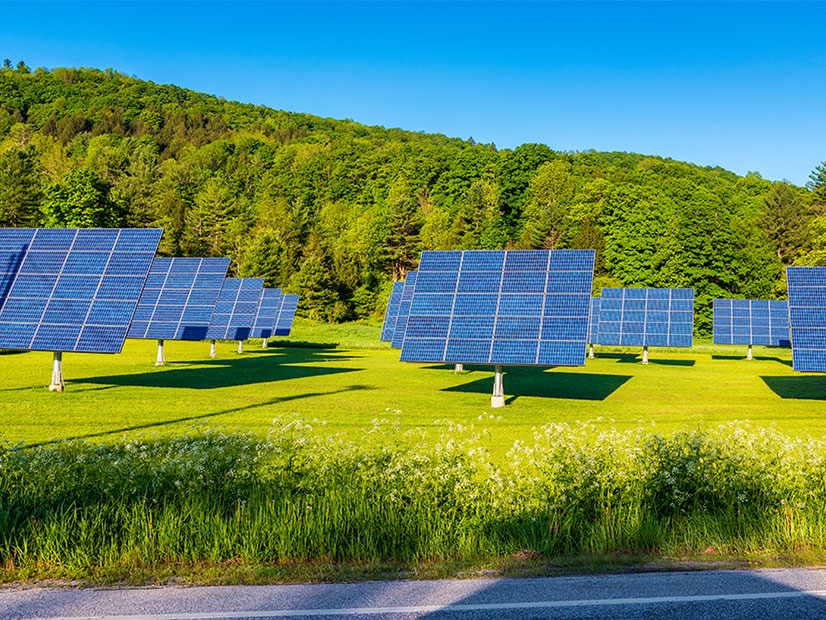ISO-NE will seek to extend its FERC Order 2222 compliance deadline until February 2022, the RTO’s Director of Demand Resource Strategy Henry Yoshimura told the NEPOOL Markets Committee.
Yoshimura said the original July 19 compliance deadline was “pretty intense,” though ISO-NE has “made very substantial progress in our compliance approach. But as we kept moving forward, it just seemed as though we need more time.”
[Note: Although NEPOOL rules prohibit quoting speakers at meetings, those quoted in this article approved remarks afterward to clarify their standing on the issues.]
Yoshimura said that had the RTO kept moving toward the original compliance date, metering arrangements and tariff changes would be needed, in addition to coordinating the registration and operations of distributed energy resources with distribution utilities.
He said conversations with utilities “have been going fairly well, but there’s always room for more improvement there, so I think having more time will give us the ability to refine our approach to coordinating distributed energy resources registration and operations.”
Yoshimura added that FERC Order 2222-A might lead the RTO “to rethink some of our participation models as a result of not only that order, but the conversation leading up to that within the group stakeholder process, which has to do with how demand response might need to participate in a distributed energy resource aggregation.” (See FERC Limits State ‘Opt Out’ on DR.)
Changes to GIS, Operating Rules Adopted for Maine Thermal RECs
The MC adopted changes to the Generation Information System (GIS) and GIS Operating Rules to include the thermal renewable energy credits (RECs) requirement in Maine’s renewable portfolio standard.
Maine’s Public Utilities Commission requested the changes, and as “regulatory enhancements,” they can be adopted by the MC without additional corresponding action by the Participants Committee. The changes become effective on July 1 and apply to certificates created for energy generated on and after Jan. 1, according to a pre-vote memo from NEPOOL counsel Paul Belval of Day Pitney.
Thermal RECs will be awarded to facilities certified by the PUC to produce heat, steam, hot water or another form of thermal energy from sunlight, biomass, biogas or liquid biofuel or as a byproduct of electricity generated by Class I or Class IA resources under the RPS. To qualify for thermal RECs, a facility must have started operation after June 30, 2019, and the thermal energy must be delivered to an end-user in Maine and generated or delivered per the PUC’s energy efficiency standards.
Maine’s competitive electricity suppliers must also demonstrate that they have purchased a certain level of thermal RECs annually, starting at 0.4% in 2021 and ramping up to 4% in 2030 and beyond. The GIS and Operating Rules accommodations for Maine thermal RECs are similar to those made when New Hampshire and Massachusetts added thermal energy to their respective RPS provisions.
The GIS agreement, amended October 2020, provides that APX, the GIS Administrator, perform up to 500 hours of annual development work for enhancements each year without additional cost. APX estimates that the GIS changes for the Maine thermal RECs will require approximately 150 hours of development time. APX expects the other GIS changes targeted for July 1, including the addition of “clean existing generation” from the Massachusetts Clean Energy Standard, will require 260 hours to complete. This leaves 90 hours of development time remaining in 2021.
Other Action
The MC voted to recommend that the Participants Committee support ISO-NE’s proposal to revise Operating Procedure 9 to clarify the order of actions between coordinated transaction scheduling (CTS) and non-CTS transactions and the timing of when actions are taken on CTS transactions — either before or during operating reserve deficiencies and minimum generation emergencies.
The revisions are consistent with the net interchange that CTS software would produce if it could respond instantaneously and allow the RTO’s system operators to perform timely reductions on the CTS interface when transactions contribute to an emergency condition. These revisions will also provide a faster system response while considering the results of the day-ahead energy market. In addition, the ISO is proposing to add market notifications when CTS transactions are reduced for reserves, which will improve transparency.




